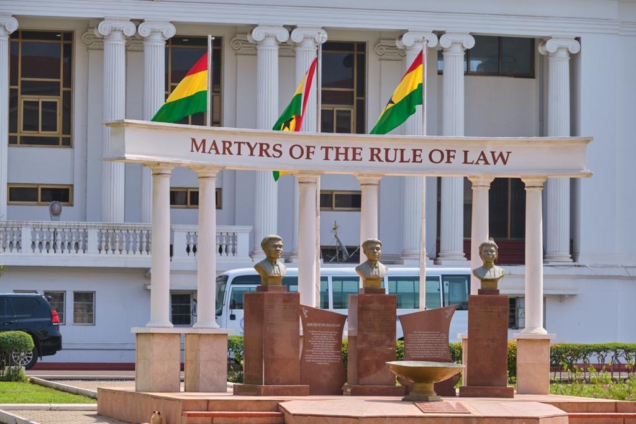Strike out portions of Sections 13, 172, and 177 of the Companies Act – Lawyer sues AG at Supreme Court
An order deleting, expunging, or striking out the said subsection sections from the said Act on grounds that they are unconstitutional.

A legal practitioner, Derick Adu-Gyamfi has invoked the original jurisdiction of the Supreme Court per Articles 2(1) and 130(1) seeking the apex court to inter alia, delete, expunge or strike out subsections of the Companies Act, 2019 (Act 992).
According to him, those subsections; 2(h)(I), 2(h)(ii), 2(a)(i), I(c), etc of Sections 13, 172, and 177 of the Act, are unconstitutional and violate the principle of fair hearing among others.
He is thus seeking inter alia, the following reliefs;
A declaration that the first part of subsection 2(h)(i) of section 13 of the Companies Act, 2019 (Act 992) which makes a proposed director on an application for incorporation to deliver to the Registrar 'a statutory declaration indicating that within the preceding five years, that proposed director has not been charged with a criminal offence involving fraud or dishonestly' is inconsistent with the letter and spirit Of articles 190), and 15(3) Of the Constitution 1992.
A declaration that the first part of subsection 2(h)(ii) of section 13 of the Companies Act, 2019 (Act 992) which makes a proposed director on an application for incorporation to deliver to the Registrar 'a statutory declaration indicating that within the preceding five years, that proposed director has not been charged with a criminal offence relating to the promotion, incorporation or management of a company' is inconsistent with the letter and spirit of articles 19(1), 19(2)(c) and 15(3) of the Constitution 1992.
A declaration that the first part of subsection 2(a)(i) of section 172 of the Companies Act, 2019 (Act 992) which prohibits a person 'charged with a criminal offence involving fraud or dishonesty' from becoming a director of a company is inconsistent with the letter and spirit of articles 19(1), 19(2)(c) and 15(3) of the Constitution 1992.
A declaration that the first part of subsection of section 172 of the Companies Act, 2019 (Act 992) which prohibits a person 'charged with a criminal offence relating to the promotion, incorporation or management of a company' from becoming a director Of a company is inconsistent with the letter and spirit of articles 19(1), 19(2)(c) and 15 (3) of the Constitution 1992.
A declaration that subsection I(c) of section 177 of the Companies Act, 2019 (Act 992) which restrains a person who 'has been culpable of a criminal offence, whether convicted or not in relation to a body corporate or of fraud or breach of duty in relation to a body corporate' from being a director except with leave of court is inconsistent with the letter and spirit of articles 190), and 15(3) of the Constitution 1992.
A declaration that subsection I(e) of section 177 of the Companies Act, 2019 (Act 992) which restrains a person who is the subject of 'an ongoing investigation by a criminal investigating body or by the Registrar or the equivalent in a foreign jurisdiction' from being a director except with leave of court is inconsistent with the letter and spirit of articles 19(1), and 15(3) of the Constitution 1992.
A declaration that the said first parts of subsections 2(h)(i) and 2(h) (ii) of section 13 of the Companies Act, 2019 (Act 992) and the first parts of subsections 2(a)(i) and 2(a)(ii) of section 172 and subsections I (c) and I(e) of section 177 of the Companies Act, 2019 (Act 99) are legally vague and overboard and accordingly unconstitutional.
A declaration that the word 'charged' as stated in subsections 2(h)(i), 2(h)(ii) of section 13 and subsections 2(a)(i) and 2(a)(ii) of section 172 of the Companies Act, 2019 (Act 992) which has already made a person guilty until proven innocent is inconsistent with the letter and spirit of articles 19(1), and 15(3) of the Constitution 1992.
A declaration that the said first parts Of Subsections and of section 13 and subsections 2(a)(i) and 2(a)(ii) of section 172 of the Companies Act, 2019 (Act 992) which has already made a person merely charged with a criminal offence guilty, is inconsistent with the principle Of presumption Of innocence as enshrined in the 1992 Constitution.
A declaration that subsections I(c) and I(e) of section 177 of the Companies Act, 2019 (Act 992) which mandates that without leave Of court a person culpable Of a criminal offence whether convicted or not or a person who is subject of an ongoing investigation by a criminal investigating body or by the Registrar or the equivalent in a foreign jurisdiction cannot act as director, is inconsistent with the principle of presumption of innocence as enshrined in the 1992 Constitution.
A declaration that the said first parts of subsections 2(h)(i) and 2(h)(ii) of section 13 and subsections 2(a)(i) and 2(a)(ii) of section 172 of the Companies Act, 2019 (Act 992) takes away the fundamental human rights of a person who is eligible to be appointed as a director because Of a mere •charge' Of criminal offence.
A declaration that subsections I(c) and I(e) of section 177 of the Companies Act, 2019 (Act 992) takes away the fundamental human rights of a person who is eligible to act as director where the person is not convicted of a criminal offence or where the person is a subject of ongoing investigation by a criminal investigating body or by the Registrar or the equivalent in a foreign jurisdiction,
A declaration that the said first parts of the impugned subsections 2(h)(i) and 2(h)(ii) of section 13 and subsections 2(a)(i) and 2(a)(ii) of section 172 and the whole of subsections I(c) and I(e) of section 177 of the Companies Act, 2019 (Act 992) violates the principle of fair hearing and the presumption of innocence.
An order deleting, expunging or striking out the said subsection sections from the said Act on grounds that they are unconstitutional.
Any other order(s) as this Honourable Court may deem fit.


